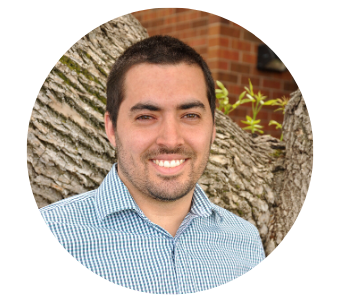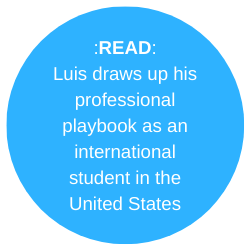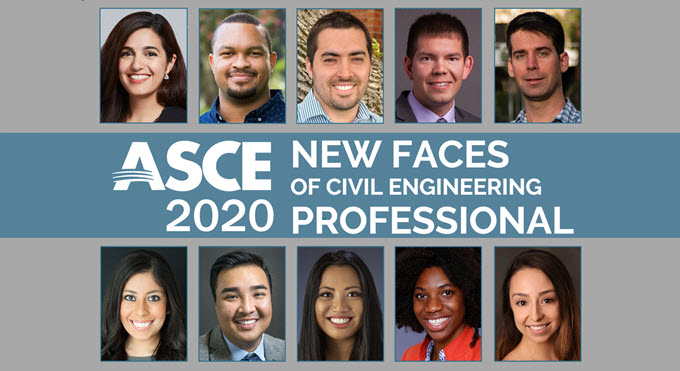Luis Duque has made it all look easy – balancing his civil engineering career success with family (second baby on the way this summer) and community service.
But don’t be fooled. It might appear easy now, but getting to this point was no easy journey.
Flash back four years ago. Duque graduated from South Dakota State University. But with rent due and no civil engineering firms returning his calls, he wound up spending the summer doing maintenance work on campus.
Painting dorm rooms and cleaning bathrooms.
“I’ll tell you, it wasn’t easy. It wasn’t easy at all. It wasn’t easy work. Not a lot of people want to be doing that for a living,” Duque said. “But I had to do something for rent and to eat.
 “It wasn’t pretty, but that’s what was available for me at the time. And no matter what job you’re doing, you’re going to have to use a lot of the same core skills – you have to work hard, you have to be on time, you have to be responsible. So, I just looked at it as an opportunity to perfect those skills.
“It wasn’t pretty, but that’s what was available for me at the time. And no matter what job you’re doing, you’re going to have to use a lot of the same core skills – you have to work hard, you have to be on time, you have to be responsible. So, I just looked at it as an opportunity to perfect those skills.
“And when it was done, I was excited for the next thing.”
That next thing was a fully funded master’s degree program at South Dakota State. And the next thing led to the next thing led to the next thing.
Now Duque works as a bridge engineer at Foothill Bridge Co. in Boulder, Colorado; he’s heavily involved in ASCE’s Structural Engineering Institute, ASCE’s Denver Younger Member Group and Engineers Without Borders; and ASCE has honored him as a 2020 New Face of Civil Engineering.
‘On top of your game’
Duque’s success story starts on a tennis court.
“Believe it or not, I think tennis is really closely related to my profession,” Duque said. “It is such a mental sport. You have to be so focused, detail oriented. You have to be on top of your game. Those skills translate very well to engineering.”
Growing up in Colombia, Duque started playing tennis when he was 8. He’d go to school each day until about 3 p.m. and then practice tennis until 8. He remembers much of his childhood traveling around Colombia playing in tournaments.
By the age of 16, he was the seventh-ranked junior tennis player in Colombia.
College scholarships entered the picture. He had opportunities to play in Florida and Arizona. He also knew that he wanted to be a structural engineer, having followed his father’s work as an architect on site visits and construction projects. South Dakota State was the school that allowed him to pursue both tennis and his career dreams. After two successful seasons, he elected to “retire” from tennis so that he could focus on his studies.
“Classes had started to get a lot harder,” said Duque with a laugh. “I knew I was not going to be a professional tennis player. I was not going to make a living out of tennis. It was just a smart decision to call it quits at that point and start developing my professional career.”
He still credits tennis with starting his journey.
“I would say tennis was the No. 1 reason I ended up in the U.S.,” Duque said. “I met my wife here. I have an awesome career. I’ve met some incredible people. So that basically changed my life.”
Duque is passionate about sharing his immigration story to help others who might be making the same move to study and work in the United States. He wants them to have a realistic idea of what they’re getting into and how to best navigate the ups and downs.
Let us not forget the summer job cleaning bathrooms.
“It’s not easy. The language barrier was difficult at the beginning, but you have to overcome that,” Duque said. “I didn’t get my first structural engineering job until I had my master’s degree. And it’s not like I didn’t look for opportunities. There are quite a bit of restrictions on international students. And a lot of companies don’t want to invest in you because they know you will require a work permit, or your student visa is limited.
“There are a lot of different challenges that international students have to overcome in order to be successful, but if you’re motivated, if you find the right fit at the right company and you show that you’re invested in this profession, there are a lot of companies that are looking for you.
 “Don’t get discouraged if you are going through tough times.”
“Don’t get discouraged if you are going through tough times.”
Service engineering
As Duque continues to move up in his career, he keeps his focus on the core reason he was attracted to civil engineering in the first place: giving back.
He has volunteered with EWB for service projects in Bolivia, Guatemala, Puerto Rico, and more local to his home in Colorado. He calls this work the highlight of his career so far.
“I could be making millions of dollars being an engineer but if I was not using that knowledge to help other people, then my career, it’s meaningless,” Duque said. “Engineers should always be looking to help people. And there’s so many people who need our help.”
His goals for the future are less concerned with salary or status than with the essence of the work.
“It sounds kind of tacky, but I really love structural engineering. I really enjoy talking to people, being challenged and learning something new every single day,” Duque said.
“I want to continue to be involved with all these organizations, always be on the lookout for new opportunities. Be thankful for what you’ve been given and all the opportunities that you have, and know there is so much more you can do. I will never stop working toward helping others.”




Thank you for giving such a life learning massasges
Thank you for sharing with us such experience.
We will also learn to be patient and help others.